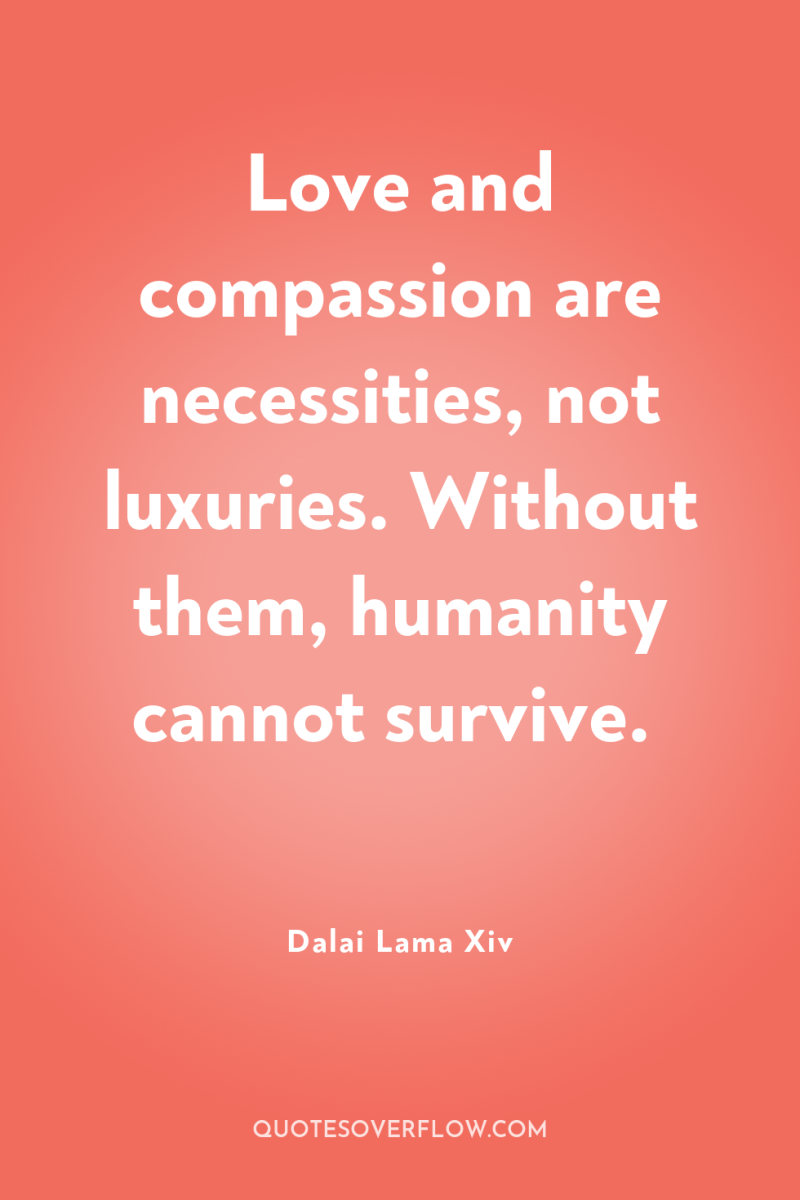
Love and compassion are necessities, not luxuries. Without them, humanity cannot survive.Dalai Lama Xiv

Remember that the best relationship is one in which your love for each other exceeds your need for each other.Dalai Lama Xiv

The more you are motivated by Love, The more Fearless & Free your action will be.Dalai Lama Xiv
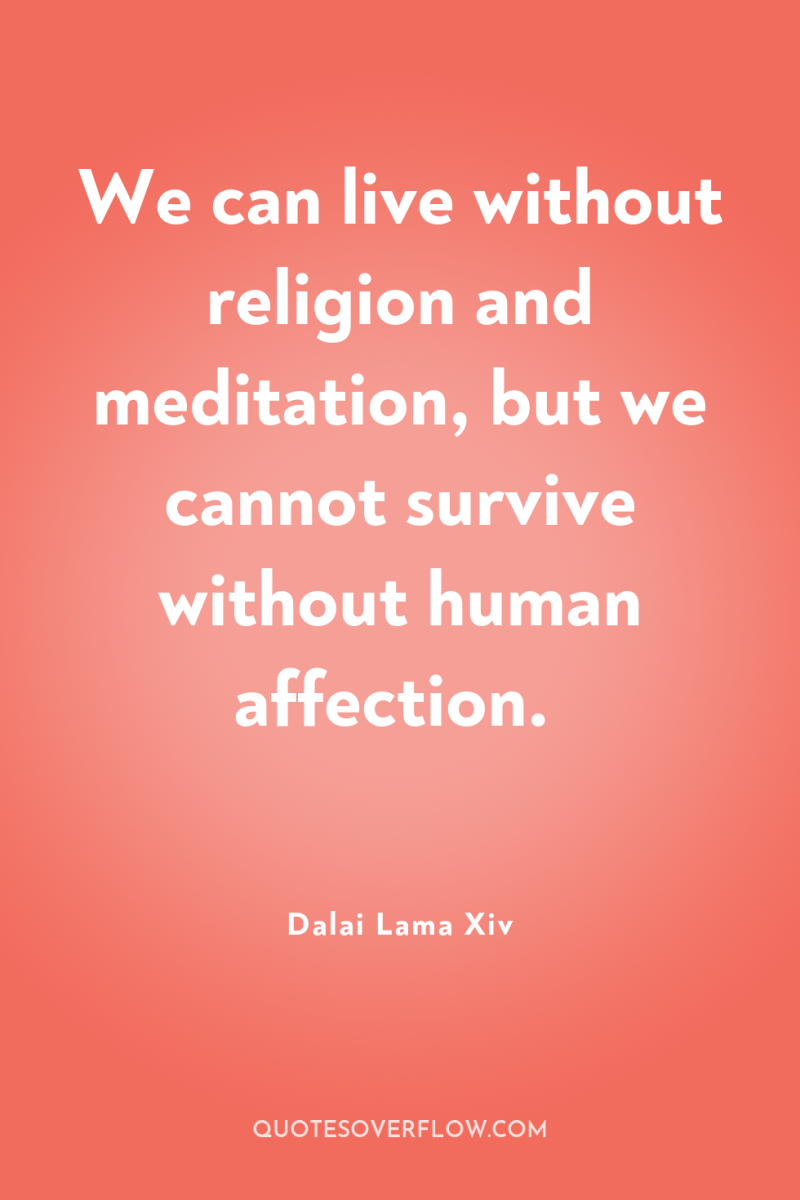
We can live without religion and meditation, but we cannot survive without human affection.Dalai Lama Xiv
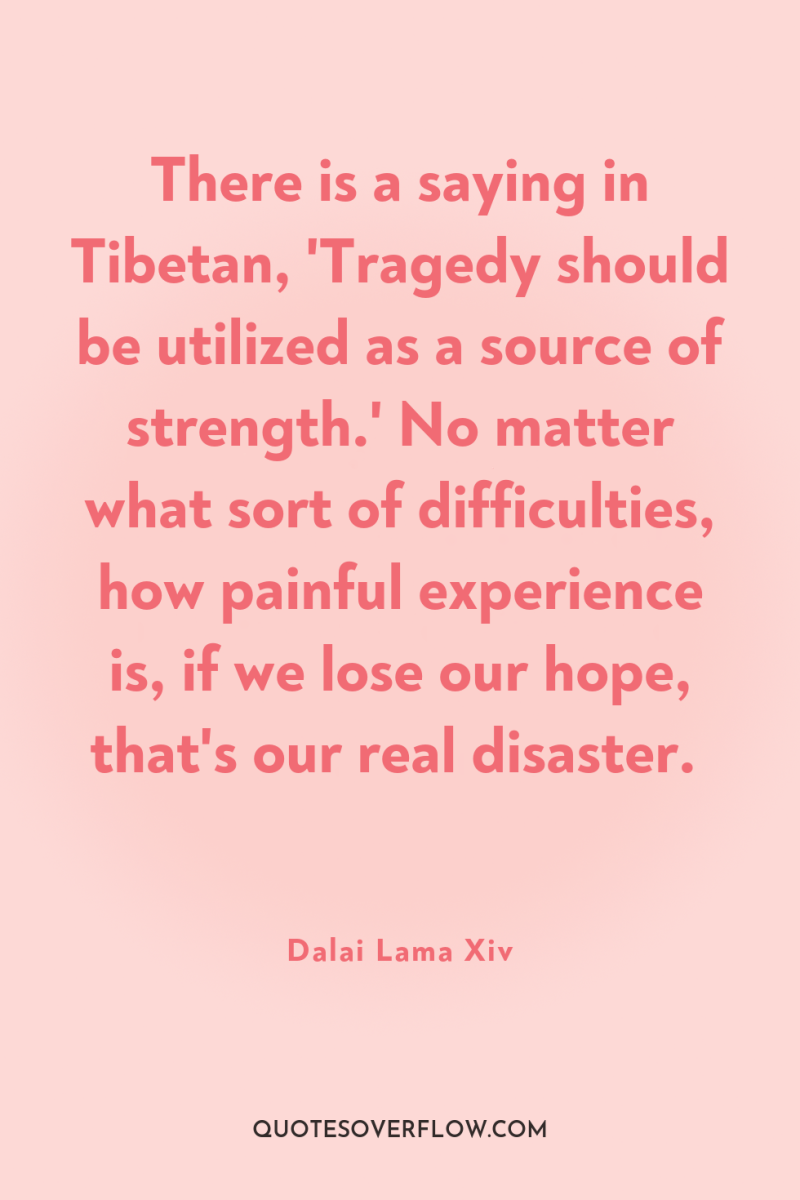
There is a saying in Tibetan, 'Tragedy should be utilized as a source of strength.' No matter what sort of difficulties, how painful experience is, if we lose our hope, that's our real disaster.Dalai Lama Xiv
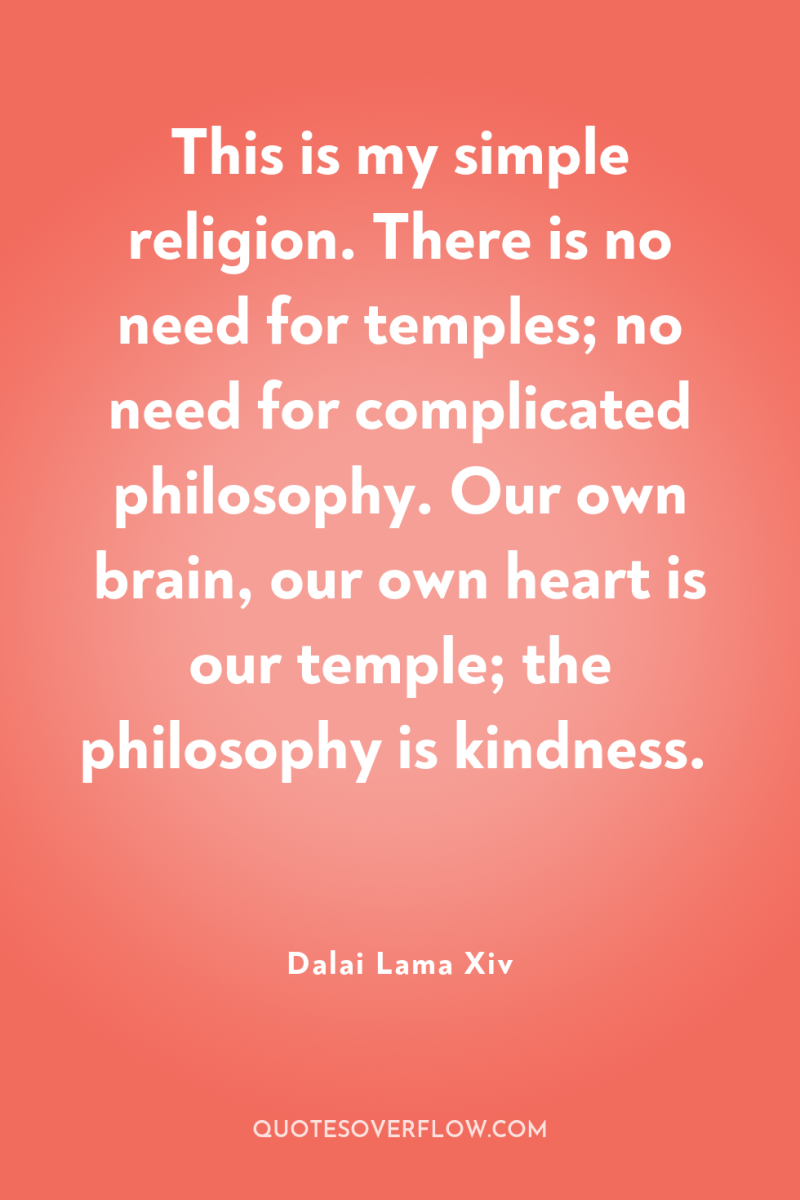
This is my simple religion. There is no need for temples; no need for complicated philosophy. Our own brain, our own heart is our temple; the philosophy is kindness.Dalai Lama Xiv
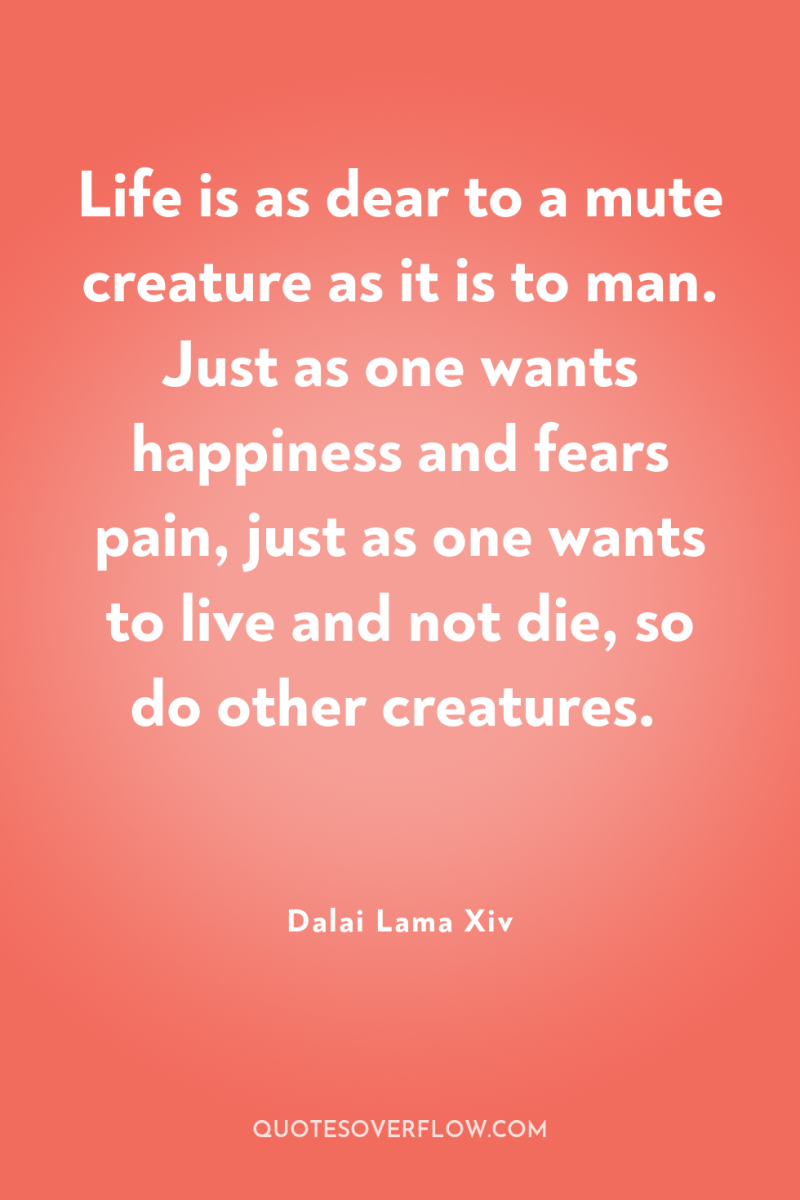
Life is as dear to a mute creature as it is to man. Just as one wants happiness and fears pain, just as one wants to live and not die, so do other creatures.Dalai Lama Xiv

Happiness is not something ready made. It comes from your own actions.Dalai Lama Xiv
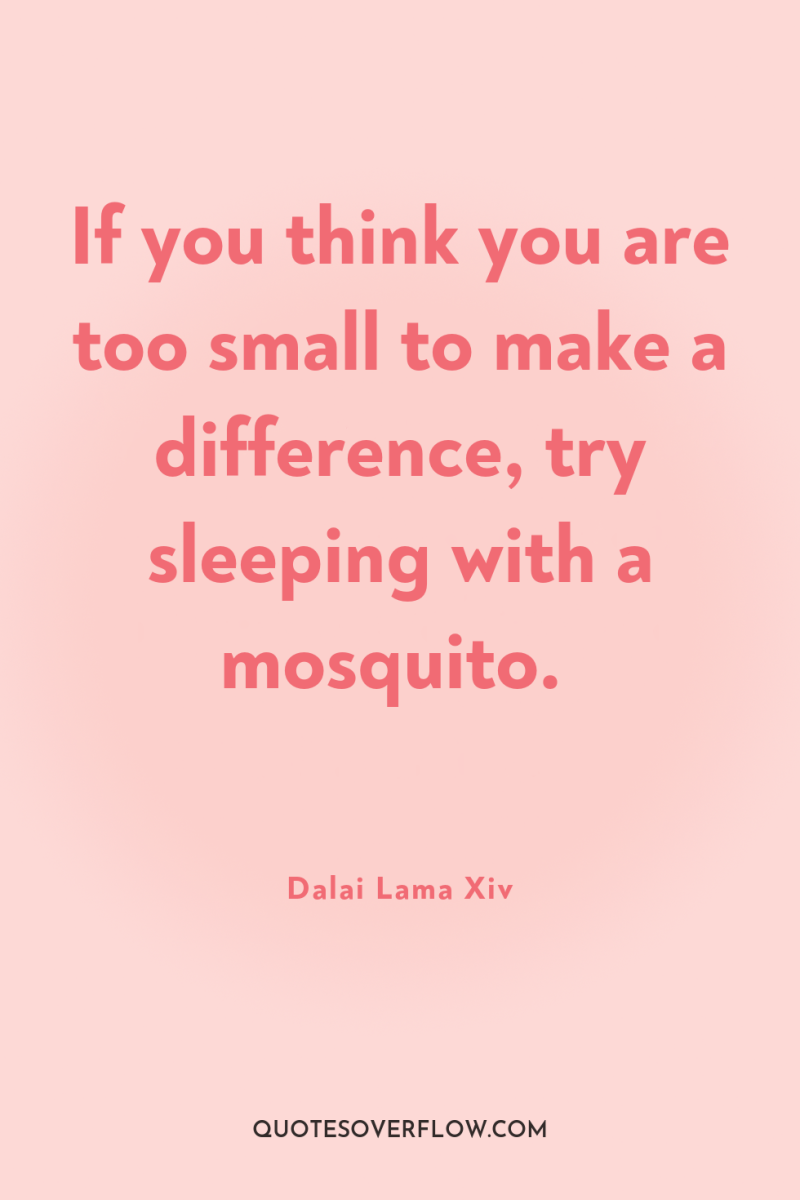
If you think you are too small to make a difference, try sleeping with a mosquito.Dalai Lama Xiv
Every day, think as you wake up, today I am fortunate to be alive, I have a precious human life, I am not going to waste it. I am going to use all my energies to develop myself, to expand my heart out to others; to achieve enlightenment for the benefit of all beings. I am going to have kind thoughts towards others, I am not going to get angry or think badly about others. I am going to benefit others as much as I can. .Dalai Lama Xiv
If a problem is fixable, if a situation is such that you can do something about it, then there is no need to worry. If it's not fixable, then there is no help in worrying. There is no benefit in worrying whatsoever.Dalai Lama Xiv
Look at children. Of course they may quarrel, but generally speaking they do not harbor ill feelings as much or as long as adults do. Most adults have the advantage of education over children, but what is the use of an education if they show a big smile while hiding negative feelings deep inside? Children donÂ’t usually act in such a manner. If they feel angry with someone, they express it, and then it is finished. They can still play with that person the following day.Dalai Lama Xiv
To be kind, honest and have positive thoughts; to forgive those who harm us and treat everyone as a friend; to help those who are suffering and never to consider ourselves superior to anyone else: even if this advice seems rather simplistic, make the effort of seeing whether by following it you can find greater happiness.Dalai Lama Xiv
Hard times build determination and inner strength. Through them we can also come to appreciate the uselessness of anger. Instead of getting angry nurture a deep caring and respect for troublemakers because by creating such trying circumstances they provide us with invaluable opportunities to practice tolerance and patience.Dalai Lama Xiv
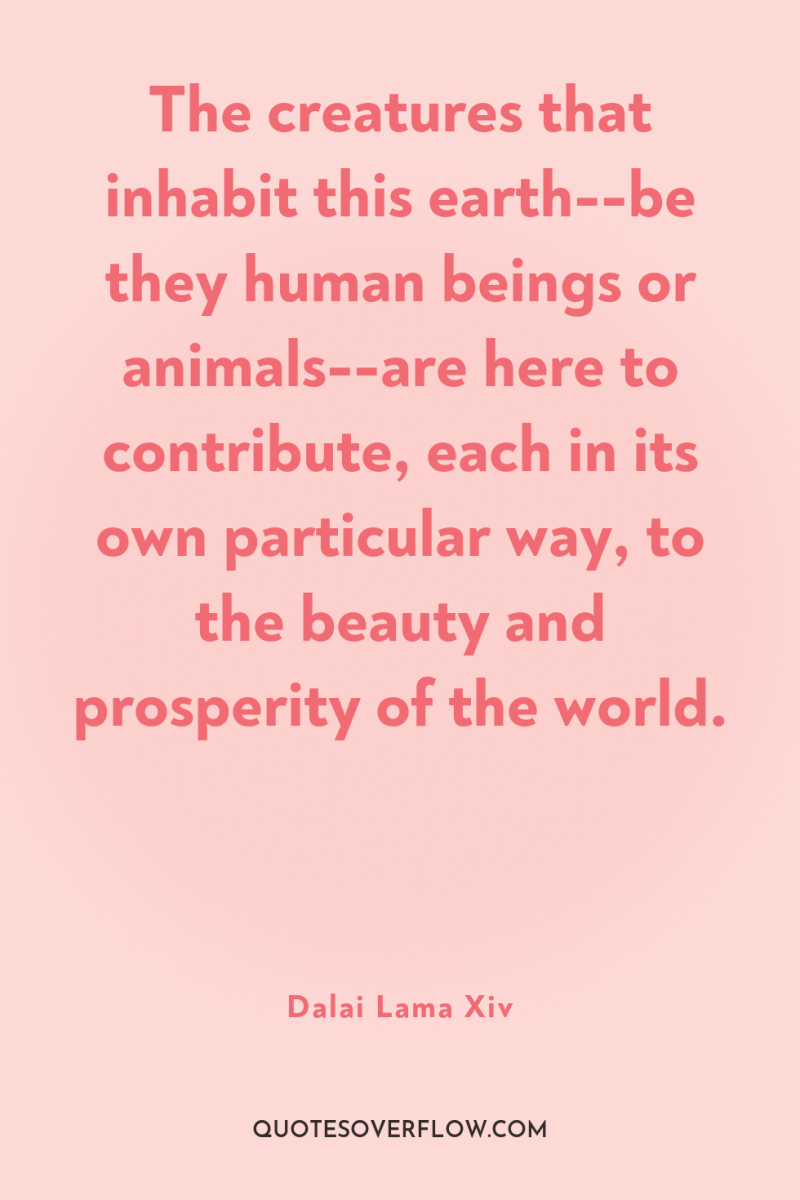
The creatures that inhabit this earth--be they human beings or animals--are here to contribute, each in its own particular way, to the beauty and prosperity of the world.Dalai Lama Xiv
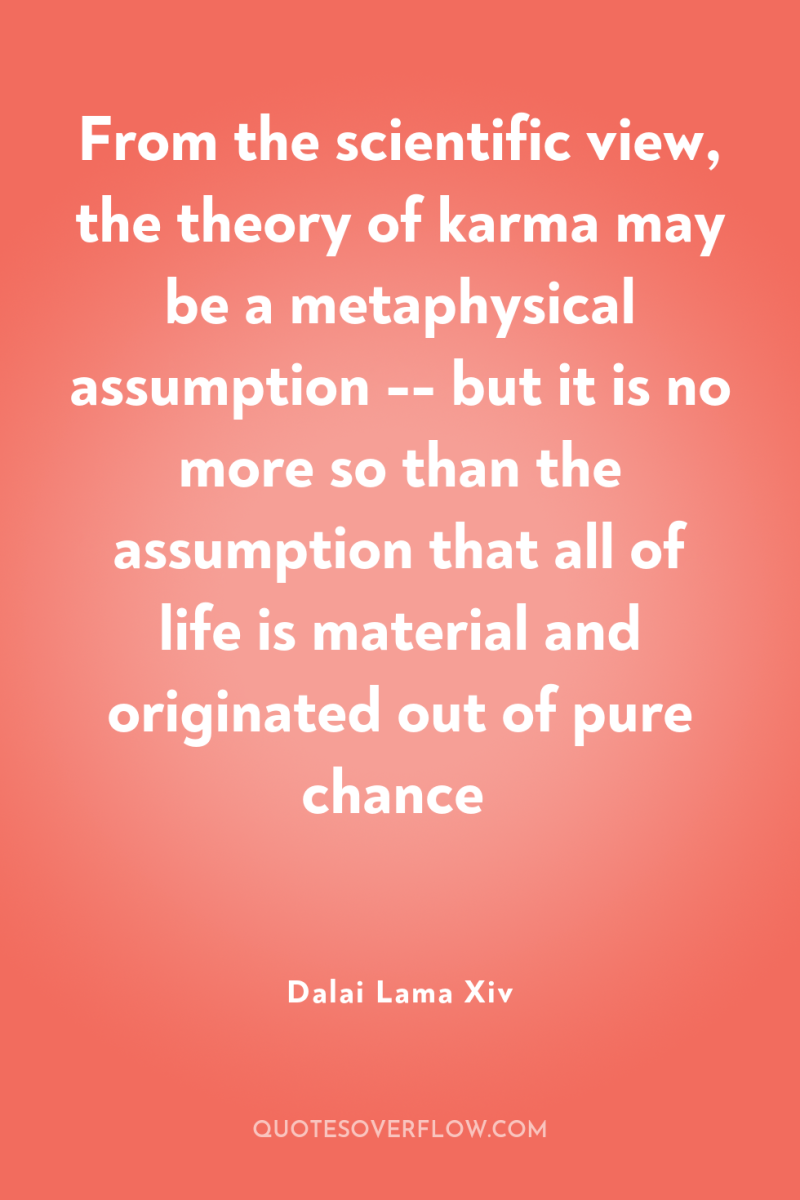
From the scientific view, the theory of karma may be a metaphysical assumption -- but it is no more so than the assumption that all of life is material and originated out of pure chanceDalai Lama Xiv
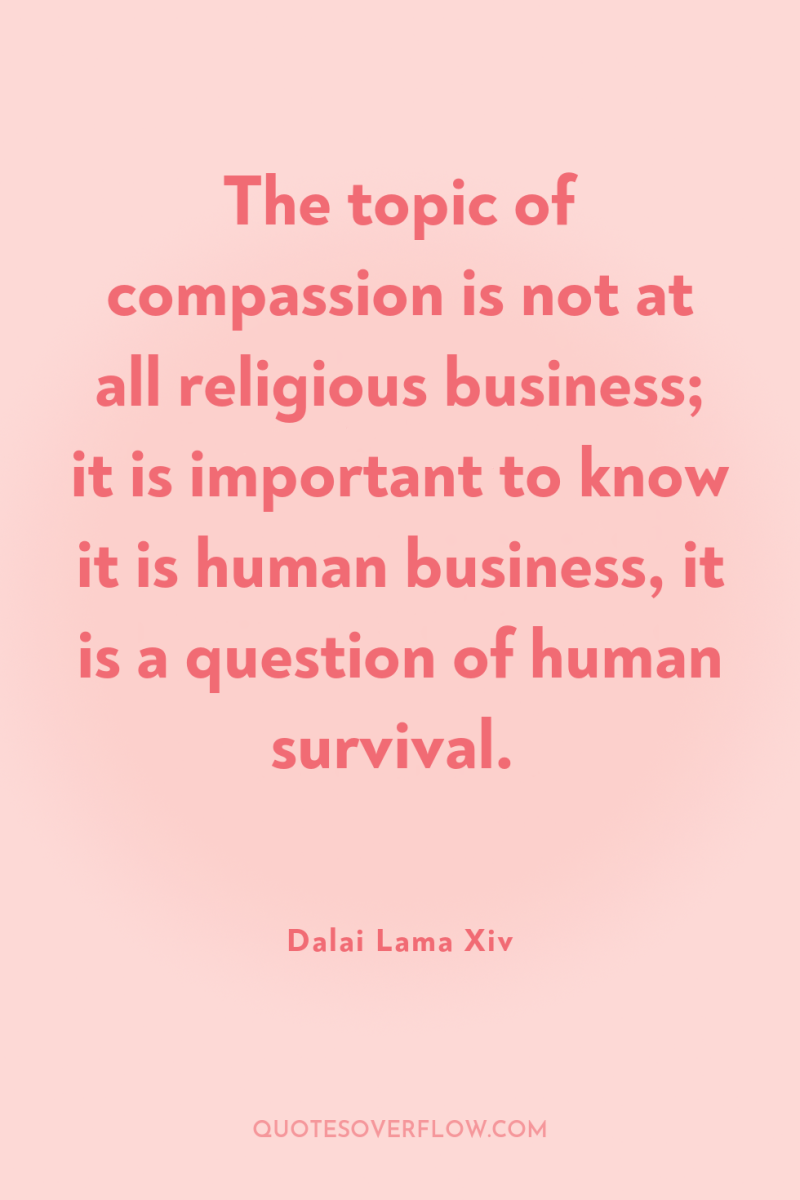
The topic of compassion is not at all religious business; it is important to know it is human business, it is a question of human survival.Dalai Lama Xiv
From my own limited experience, I have found that the greatest degree of inner tranquility comes from the development of love and compassion. The more we care for the happiness of others, the greater our own sense of well-being becomes. Cultivating a close, warmhearted feeling for others automatically puts the mind at ease. This helps remove whatever fears or insecurities we may have and gives us the strength to cope with any obstacles we encounter. It is the ultimate source of success in life.Dalai Lama Xiv
One problem with our current society is that we have an attitude towards education as if it is there to simply make you more clever, make you more ingenious… Even though our society does not emphasize this, the most important use of knowledge and education is to help us understand the importance of engaging in more wholesome actions and bringing about discipline within our minds. The proper utilization of our intelligence and knowledge is to effect changes from within to develop a good heart.Dalai Lama Xiv
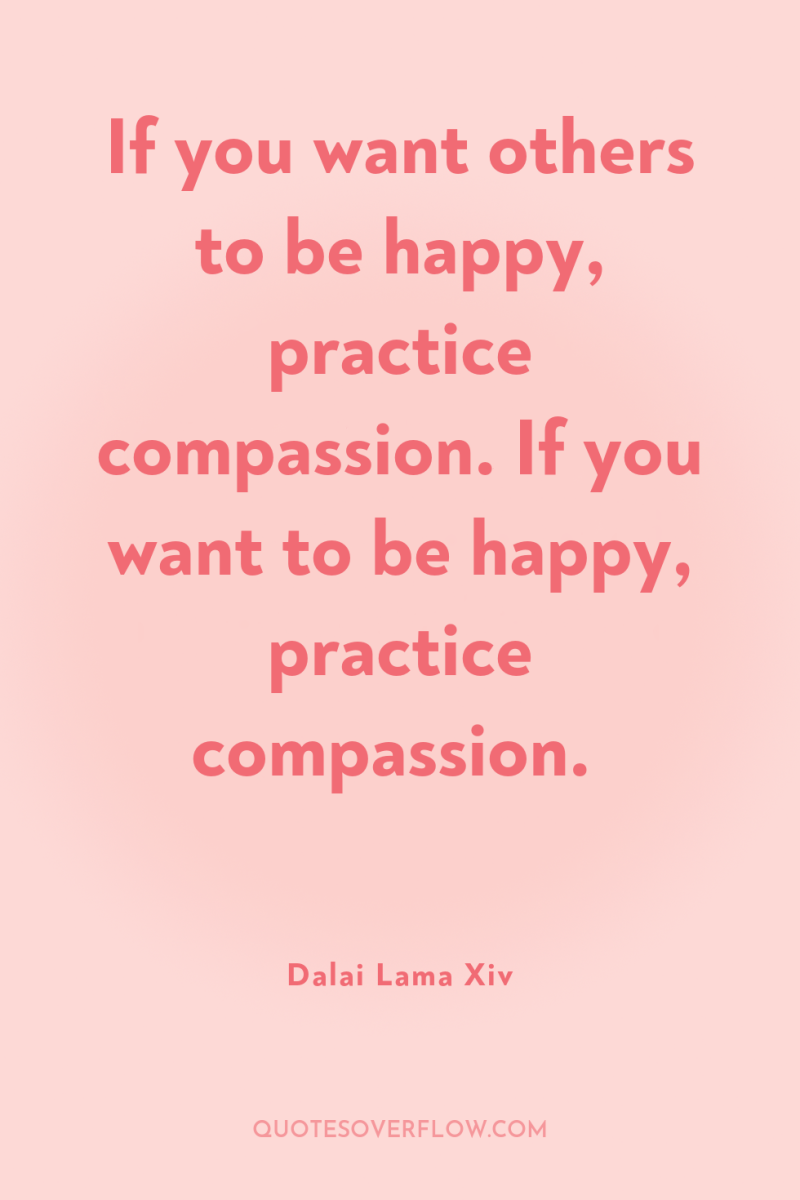
If you want others to be happy, practice compassion. If you want to be happy, practice compassion.Dalai Lama Xiv
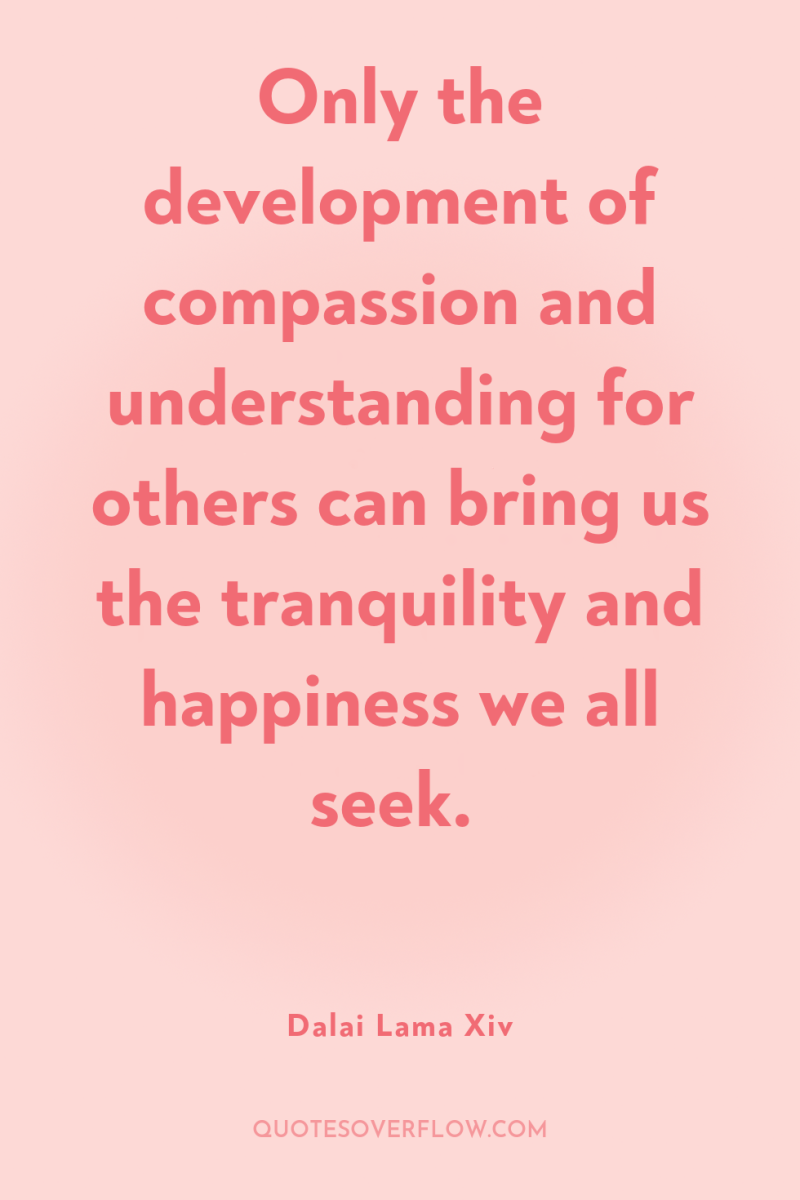
Only the development of compassion and understanding for others can bring us the tranquility and happiness we all seek.Dalai Lama Xiv
I believe compassion to be one of the few things we can practice that will bring immediate and long-term happiness to our lives. I’m not talking about the short-term gratification of pleasures like sex, drugs or gambling (though I’m not knocking them), but something that will bring true and lasting happiness. The kind that sticks.Dalai Lama Xiv
A disciplined mind leads to happiness, and an undisciplined mind leads to suffering.Dalai Lama Xiv
Sometimes when I meet old friends, it reminds me how quickly time passes. And it makes me wonder if we've utilized our time properly or not. Proper utilization of time is so important. While we have this body, and especially this amazing human brain, I think every minute is something precious. Our day-to-day existence is very much alive with hope, although there is no guarantee of our future. There is no guarantee that tomorrow at this time we will be here. But we are working for that purely on the basis of hope. So, we need to make the best use of our time. I believe that the proper utilization of time is this: if you can, serve other people, other sentient beings. If not, at least refrain from harming them. I think that is the whole basis of my philosophy. So, let us reflect what is truly of value in life, what gives meaning to our lives, and set our priorities on the basis of that. The purpose of our life needs to be positive. We weren't born with the purpose of causing trouble, harming others. For our life to be of value, I think we must develop basic good human qualities–warmth, kindness, compassion. Then our life becomes meaningful and more peaceful–happier. .Dalai Lama Xiv
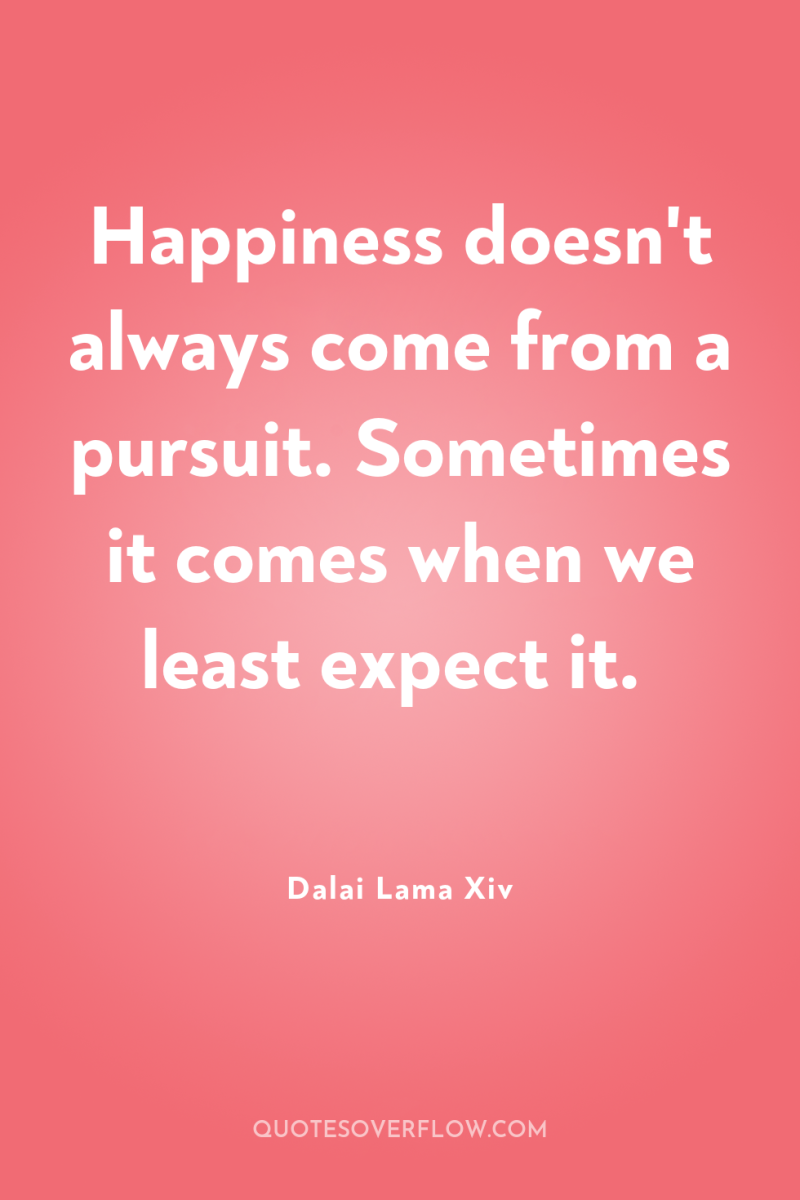
Happiness doesn't always come from a pursuit. Sometimes it comes when we least expect it.Dalai Lama Xiv

Love is the absence of judgment.Dalai Lama Xiv

People take different roads seeking fulfillment and happiness. Just because they’re not on your road doesn’t mean they’ve gotten lost.Dalai Lama Xiv
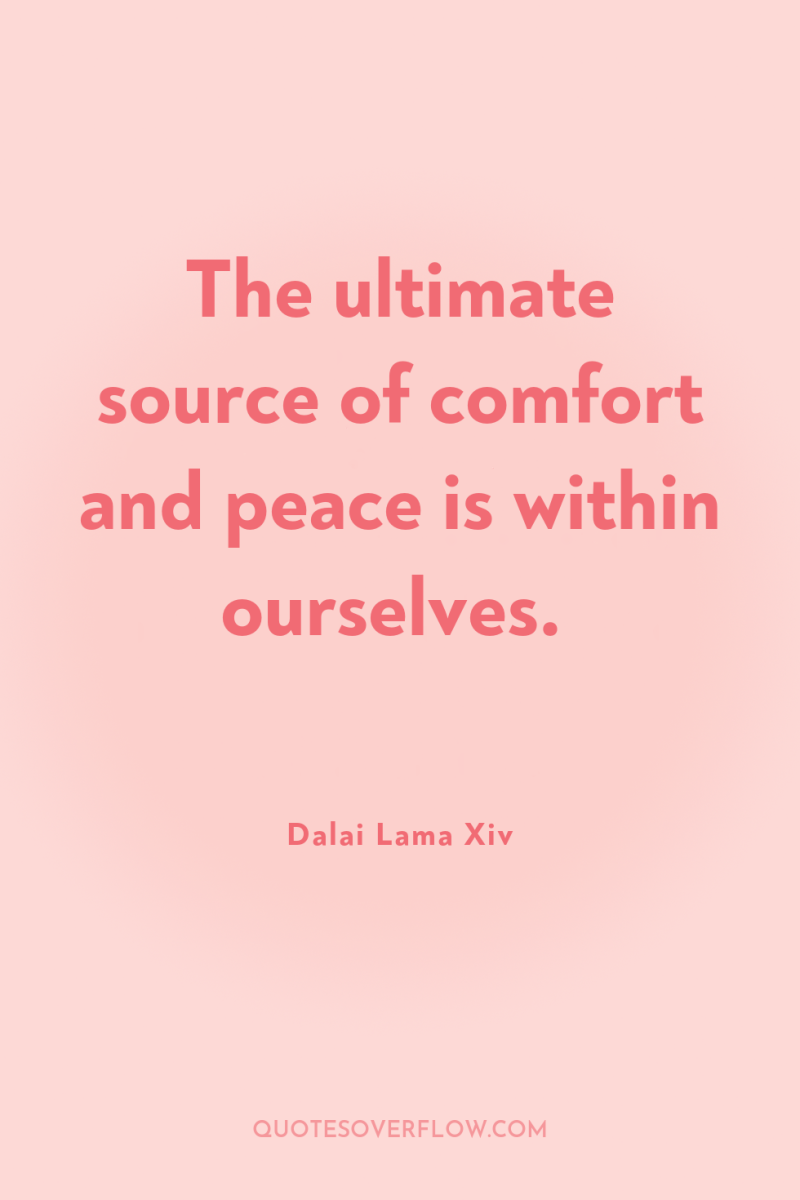
The ultimate source of comfort and peace is within ourselves.Dalai Lama Xiv
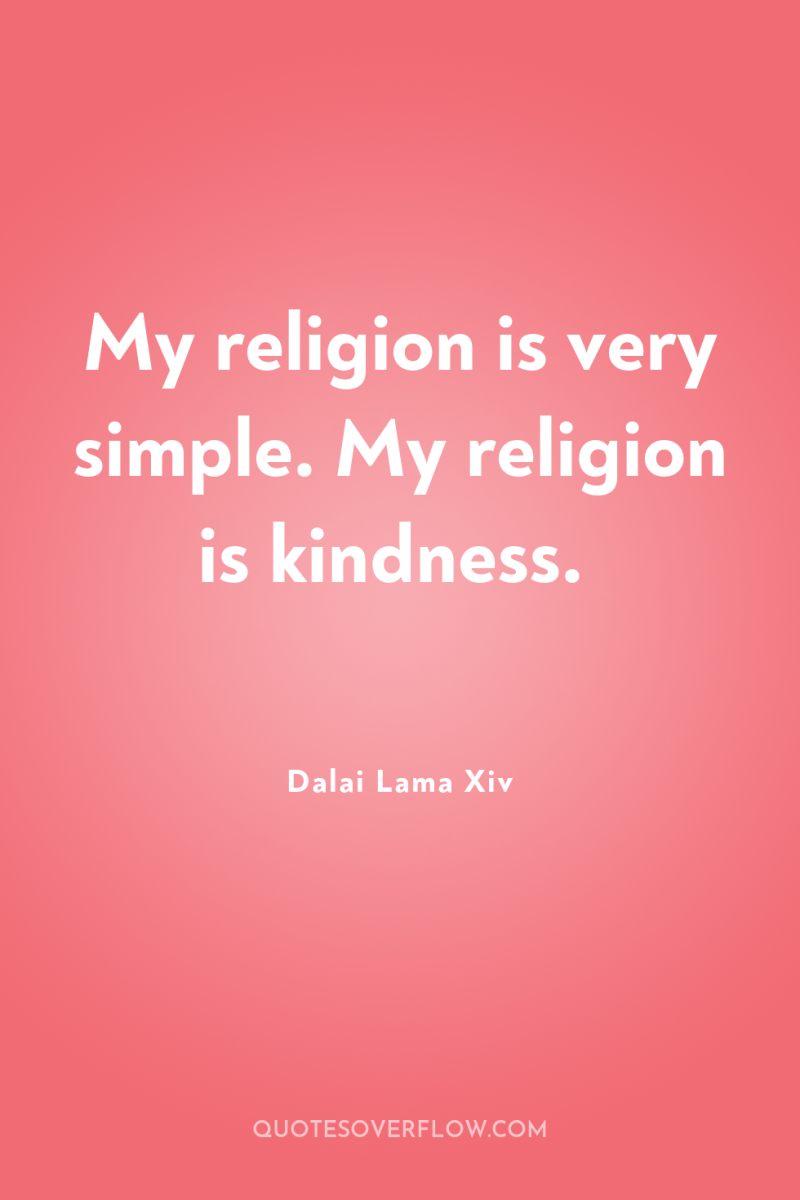
My religion is very simple. My religion is kindness.Dalai Lama Xiv
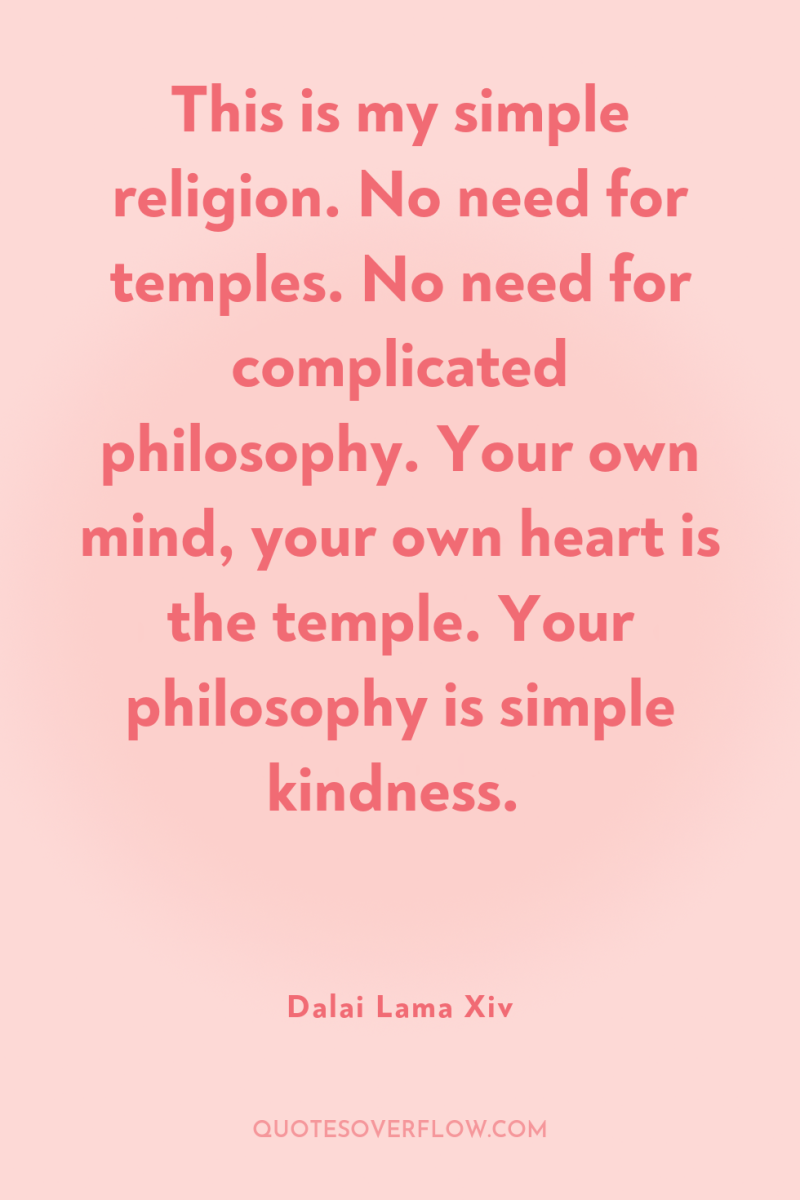
This is my simple religion. No need for temples. No need for complicated philosophy. Your own mind, your own heart is the temple. Your philosophy is simple kindness.Dalai Lama Xiv
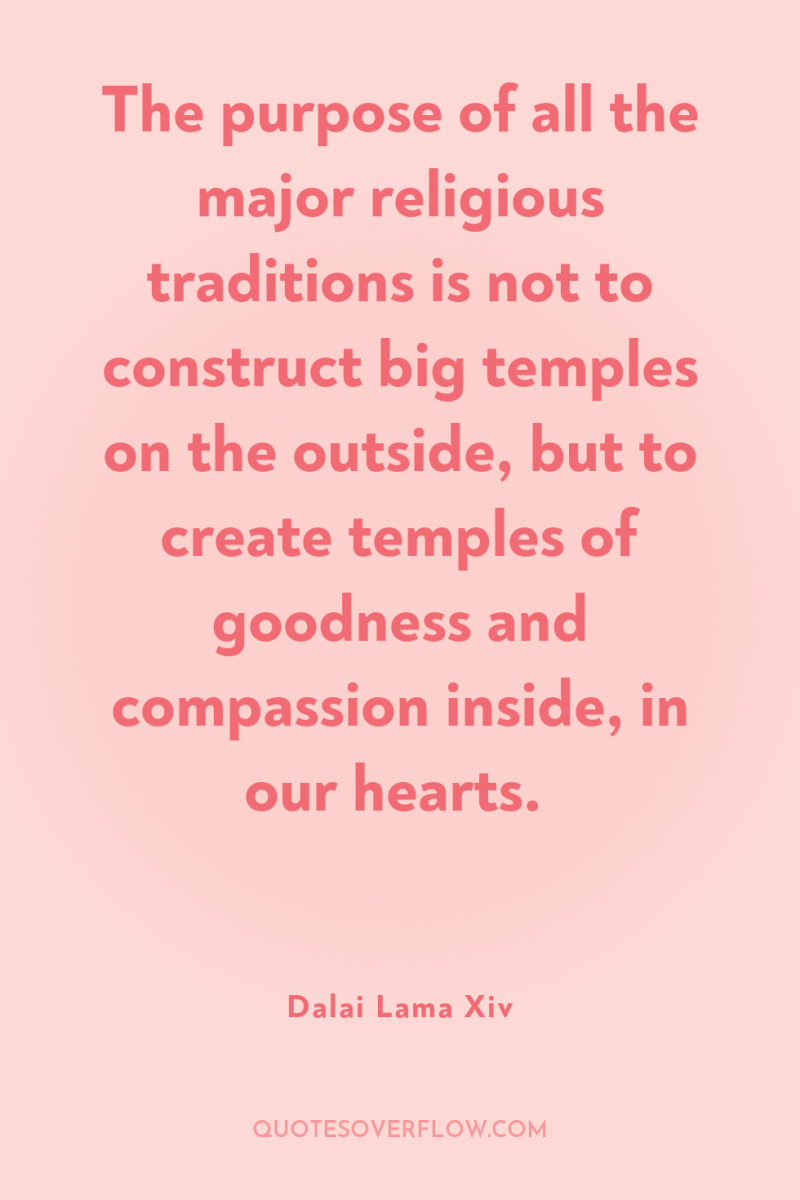
The purpose of all the major religious traditions is not to construct big temples on the outside, but to create temples of goodness and compassion inside, in our hearts.Dalai Lama Xiv
We can reject everything else: religion, ideology, all receivedwisdom. But we cannot escape the necessity of love and compassion.. This, then, is my true religion, my simple faith. In this sense, there is no needfor temple or church, for mosque or synagogue, no need for complicatedphilosophy, doctrine or dogma. Our own heart, our own mind, is the temple. The doctrine is compassion. Love for others and respect for their rights anddignity, no matter who or what they are: ultimately these are all we need. So long as we practice these in our daily lives, then no matter if we arelearned or unlearned, whether we believe in Buddha or God, or follow someother religion or none at all, as long as we have compassion for others andconduct ourselves with restraint out of a sense of responsibility, there isno doubt we will be happy.Dalai Lama Xiv
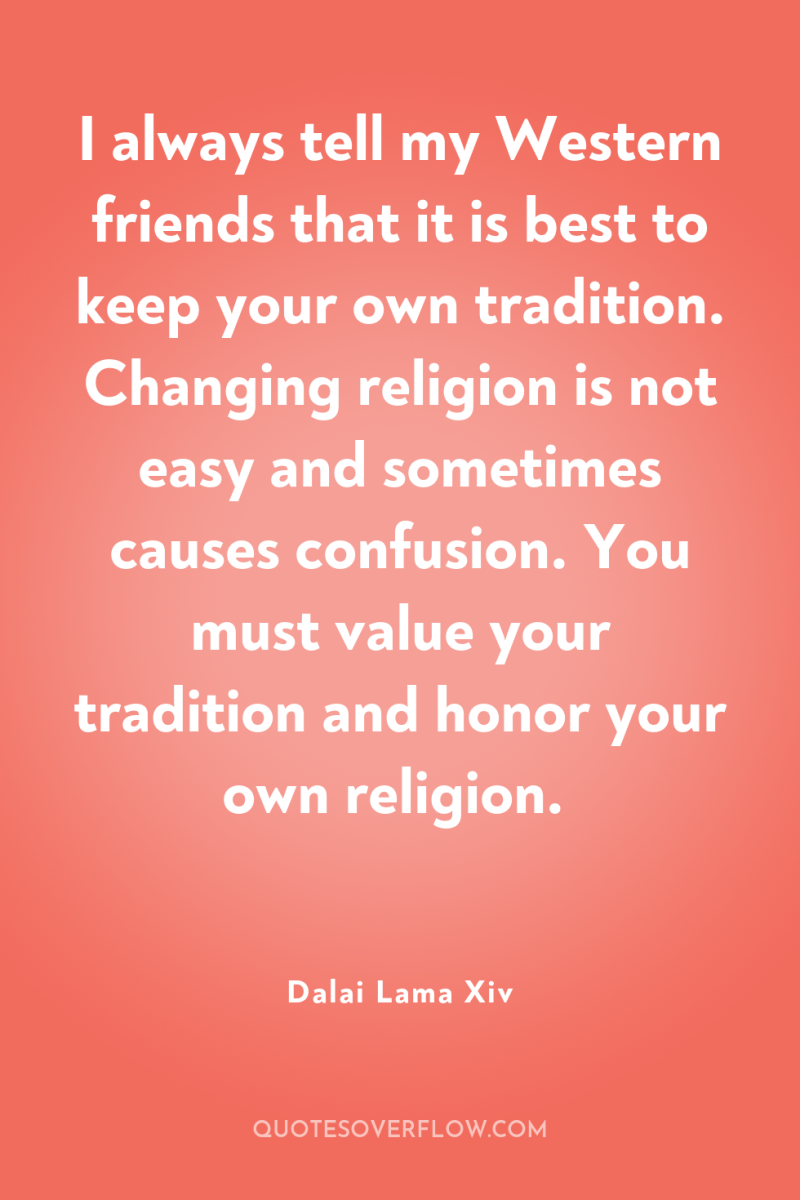
I always tell my Western friends that it is best to keep your own tradition. Changing religion is not easy and sometimes causes confusion. You must value your tradition and honor your own religion.Dalai Lama Xiv
For a considerable portion of humanity today, it is possible and indeed likely that one's neighbor, one's colleague, or one's employer will have a different mother tongue, eat different food, and follow a different religion than oneself. It is a matter of great urgency, therefore, that we find ways to cooperate with one another in a spirit of mutual acceptance and respect. In such a world, I feel, it is vital for us to find genuinely sustainable and universal approach to ethics, inner values, and personal integrity-an approach that can transcend religious, cultural, and racial differences and appeal to people at a sustainable, universal approach is what I call the project of secular ethics. All religions, therefore, to some extent, ground the cultivation of inner values and ethical awareness in some kind of metaphysical (that is, not empirically demonstrable) understanding of the world and of life after death. And just as the doctrine of divine judgment underlies ethical teachings in many theistic religions, so too does the doctrine of karma and future lives in non-theistic religions. As I see it, spirituality has two dimensions. The first dimension, that of basic spiritual well-being-by which I mean inner mental and emotional strength and balance-does not depend on religion but comes from our innate human nature as beings with a natural disposition toward compassion, kindness, and caring for others. The second dimension is what may be considered religion-based spirituality, which is acquired from our upbringing and culture and is tied to particular beliefs and practices. The difference between the two is something like the difference between water and tea. On this understanding, ethics consists less of rules to be obeyed than of principles for inner self-regulation to promote those aspects of our nature which we recognize as conducive to our own well-being and that of others. It is by moving beyond narrow self-interest that we find meaning, purpose, and satisfaction in life.Dalai Lama Xiv
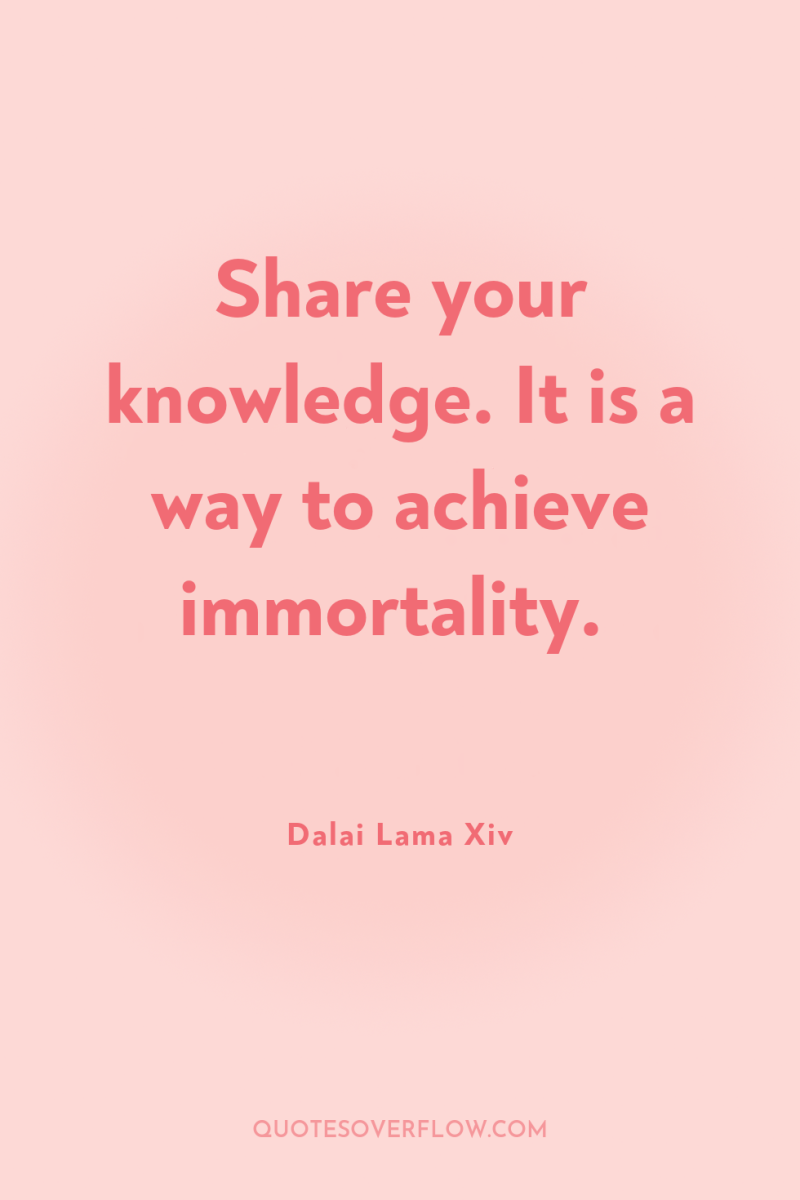
Share your knowledge. It is a way to achieve immortality.Dalai Lama Xiv
Peace does not mean an absence of conflicts; differences will always be there. Peace means solving these differences through peaceful means; through dialogue, education, knowledge; and through humane ways.Dalai Lama Xiv

Judge your success by what you had to give up in order to get it.Dalai Lama Xiv
It seems that scientific research reaches deeper and deeper. But it also seems that more and more people, at least scientists, are beginning to realize that the spiritual factor is important. I say 'spiritual' without meaning any particular religion or faith, just simple warmhearted compassion, human affection, and gentleness. It is as if such warmhearted people are a bit more humble, a little bit more content. I consider spiritual values primary, and religion secondary. As I see it, the various religions strengthen these basic human qualities. As a practitioner of Buddhism, my practice of compassion and my practice of Buddhism are actually one and the same. But the practice of compassion does not require religious devotion or religious faith; it can be independent from the practice of religion. Therefore, the ultimate source of happiness for human society very much depends on the human spirit, on spiritual values. If we do not combine science and these basic human values, then scientific knowledge may sometimes create troubles, even disaster.. .Dalai Lama Xiv
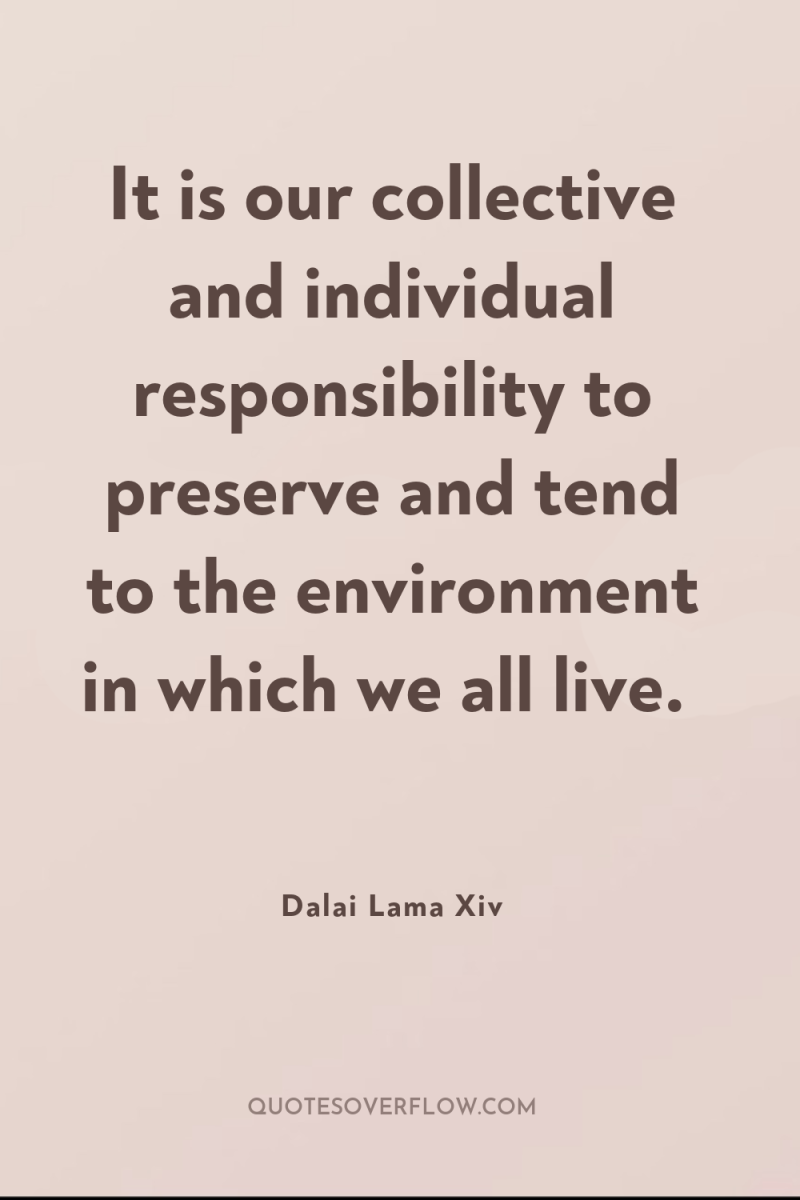
It is our collective and individual responsibility to preserve and tend to the environment in which we all live.Dalai Lama Xiv
The fundamental precept of Buddhism is Interdependence or the Law of Cause and Effect. This simply states that everything an individual experiences is derived from action through motivation. Motivation is thus the root of both action and experience. F R E E D O M IN EXILE: THE AUTOBIOGRAPHY OF THE DALAI LAMADalai Lama Xiv

Politics devoid of ethics does not further human welfare, and life without morality reduces humans to the level of beasts.Dalai Lama Xiv

Open your arms to CHANGEbut don’t let go of your VALUES.Dalai Lama Xiv
The problem is that our world and our education remain focused exclusively on external, materialistic values. We are not concerned enough with inner values. Those who grow up with this kind of education live in a materialistic life and eventually the whole society becomes materialistic. But this culture is not sufficient to tackle our human problems. The real problem is here, " the Dalai Lama said, pointed to his head. The Archbishop tapped his chest with his fingers to emphasize the heart as well. "And here, " the Dalai Lama echoed. "Mind and heart.Dalai Lama Xiv
If you can cultivate the right attitude, your enemies are your best spiritual teachers because their presence provides you with the opportunity to enhance and develop tolerance, patience and understanding.Dalai Lama Xiv
You must not hate those who do wrong or harmful things; but with compassion, you must do what you can to stop them – for they are harming themselves, as well as those who suffer from their actions.Dalai Lama Xiv
When we feel love and kindness toward others, it not only makes others feel loved and cared for, but it helps us also to develop inner happiness and peace.Dalai Lama Xiv
Generosity is the most natural outward expression of an inner attitude of compassion and loving-kindness.Dalai Lama Xiv
Meanwhile, spring came, and with it the outpourings of Nature. The hills were soon splashed with wild flowers; the grass became an altogether new and richer shade of green; and the air became scented with fresh and surprising smells -- of jasmine, honeysuckle, and lavender.Dalai Lama Xiv
World peace must develop from inner peace. Peace is not just mere absence of violence. Peace is, I think, the manifestation of human compassion.Dalai Lama Xiv
Where ignorance is our master, there is no possibility of real peace.Dalai Lama Xiv
Each one of us is responsible for reducing the negative potential of every situation we have to face.Dalai Lama Xiv
From the Buddhist point of view, all living beings -- that is, beings with feelings, experiences, and sensations -- are considered equal. Human beings can live without eating meat. As human beings, I think that deep down our nature tends towards vegetarianism and leads us to do everything in our power to prevent harming other species.Dalai Lama Xiv
Weapons never stay in their boxes. Once a weapon has been manufactured, sooner or later someone will use it. If it were possible to bring about true and lasting peace by force of arms, then we should turn all our factories into weapons factories. But that is impossible. Even though it is difficult to try to bring about peace through inner transformation, it is the only way of establishing sustainable peace in the world.Dalai Lama Xiv
War is massacre. It is 100 per cent negative.Dalai Lama Xiv
Violence can only breed more violence and suffering. Our struggle must remain non-violent and free of hatred.Dalai Lama Xiv
The theory of emptiness…is the deep recognition that there is a fundamental disparity between the way we perceive the world, including our own existence in it, and the way things actually are.Dalai Lama Xiv
To say 'I want to have sex with this person' is to express a desire which is not intellectually directed in the way that 'I want to eradicate poverty in the world' is an intellectually directed desire. Furthernore, the gratification of sexual desire can only ever give temporary satisfaction. Thus as Nagarjuna, the great Indian scholar said: 'When you have an itch, you scratch. But not to itch at all is better than any amount of scratching. .Dalai Lama Xiv
The more time you spend thinking about yourself, the more suffering you will experience.Dalai Lama Xiv
All the joy the world contains has come through wishing happiness through others. All the misery the world contains has come through wanting pleasure for oneself. Is there need for lengthy explanation?Dalai Lama Xiv
All the joy the world contains has come through wishing happiness for others. All the misery the world contains has come through wanting pleasure for oneself. Is there need for lengthy explanation?Dalai Lama Xiv
Many people today agree that we need to reduce violence in oursociety. If we are truly serious about this, we must deal with theroots of violence, particularly those that exist within each of us. Weneed to embrace 'inner disarmament, ' reducing our own emotions ofsuspicion, hatred and hostility toward our brothers and sisters.Dalai Lama Xiv
I pray for all of us, oppressor and friend, that together we may succeed in building a better worldthrough human understanding and love, and that in doing so we may reducethe pain and suffering of all sentient beings.Dalai Lama Xiv
I found, as every teacher does, that there is nothing like teaching to help one learn.Dalai Lama Xiv
By mental cultivation I mean a disciplined application of mind that involves deepening our familiarity with a chosen object or theme. Here I am thinking of the Sanskrit term bhavana, which connotes "cultivation, " and whose Tibetan equivalent, gom, has the connotation of "familiarization." These two terms, often translated into English as meditation, refer to a whole range of mental practices and not just, as many suppose, to simple methods of relaxation. The original terms imply a process of cultivating familiarity with something, whether it is a habit, a way of seeing, or a way of being.Dalai Lama Xiv
If you are honest, truthful, and transparent, people trust you. If people trust you, you have no grounds for fear, suspicion or jealousy.Dalai Lama Xiv
CIf you are honest, truthful, and transparent, people trust you. If people trust you, you have no grounds for fear, suspicion or jealousy.Dalai Lama Xiv
People should never sit alone for too long when they're crying.Dalai Lama Xiv
We can let the circumstances of our lives harden us so that we become increasingly resentful and afraid, or we can let them soften us, and make us kinder. You always have the choice.Dalai Lama Xiv
A good friend who points out mistakes and imperfections and rebukes evil is to be respected as if he reveals the secret of some hidden treasure.Dalai Lama Xiv
One of the parrots was very friendly with.. Master of the Robes. He used to feed it nuts. As it nibbled from his fingers, he used to stroke its head, at which the bird appeared to enter a state of ecstasy. I very much wanted this kind of friendliness and several times tried to get a similar response, but to no avail. So I took a stick to punish it. Of course, thereafter it fled at the sight of me. This was a very good lesson in how to make friends: not by force but by compassion.Dalai Lama Xiv
Live a life that transcends your own!Dalai Lama Xiv
A truly compassionate attitude toward others does not change even if they behave negatively or hurt you.Dalai Lama Xiv
Compassion is the radicalism of our time.Dalai Lama Xiv
Compassion is not religious business, it is human business, it is not luxury, it is essential for our own peace and mental stability, it is essential for human survival.Dalai Lama Xiv
Whether you believe in God or not does not matter so much, whether you believe in Buddha or not does not matter so much; as a Buddhist, whether you believe in reincarnation or not does not matter so much. You must lead a good life. And a good life does not mean just good food, good clothes, good shelter. These are not sufficient. A good motivation is what is needed: compassion, without dogmatism, without complicated philosophy; just understanding that others are human brothers and sisters and respecting their rights and human dignity.Dalai Lama Xiv
Ultimately humanity is one, and this small planet is our only home. If we're to protect this home of ours, each of us needs to experience a vivid sense of universal altruism and compassion.Dalai Lama Xiv
I asked the Dalai Lama what it was like to wake up with joy, and he shared his experience each morning. 'I think if you are an intensely religious believer, as soon as you wake up, you thank God for another day. And you try to do God’s will. For a nontheist like myself, but who is a Buddhist, as soon as I wake up, I remember Buddha’s teaching: the importance of kindness and compassion, wishing something good for others, or at least to reduce their suffering. Then I remember that everything is interrelated, the teaching of interdependence. So then I set my intention for the day: that this day should be meaningful. Meaningful means, if possible, serve and help others. If not possible, then at least not to harm others. That’s a meaningful day.Dalai Lama Xiv
You must not hate those who do harmful things. The compassionate thing is to do what you can to stop them--for they are harming themselves as well as those who suffer from their actions.Dalai Lama Xiv
As for my own religious practice, I try to live my life pursuing what I call the Bodhisattva ideal. According to Buddhist thought, a Bodhisattva is someone on the path to Buddhahood wo dedicates themselves entirely to helping all other sentient beings towards release from suffering. The word Bodhisattva can best be understood by translating the Bodhi and Sattva separately: Bodhi means the understanding or wisdom of the ultimate nature of reality, and a Sattva is someone who is motivated by universal compassion. The Bodhissatva ideal is thus the aspiration to practise infinite compassion with infinite wisdom. releasing sentient beings from suffering.Dalai Lama Xiv
Great compassion is the root of altruistic action, the object of amazement to the world;there is no greater source of help and happiness.Dalai Lama Xiv
If a person shows anger to you, and you show anger in return, the result is disaster. If you nurse hatred, you will never be happy, even in the lap of luxury. By contrast, if you control your anger and show its opposite - love, compassion, tolerance, and patience - then not only do you remain in peace, but gradually the anger of others also will diminish.Dalai Lama Xiv
Contemplating this suffering which is unbearable to us, and is unbearable to others, too, can produce awake mind, which arises from the compassion that wishes to free all living beings from suffering.Dalai Lama Xiv
He told me that while he was in a Chinese Communist gulag for almost eighteen years, he faced danger on a few occasions. I thought he was referencing a threat to his own life. But when I asked, "What danger?" he answered, "Losing compassion toward the Chinese.Dalai Lama Xiv
Once we are able to combine a feeling of empathy for others with a profound understanding of the suffering they experience, we become able to generate genuine compassion for them. We must work at this continually.Dalai Lama Xiv
I always try to share with others the idea that in order to become compassionate it is not necessary to become religious.Dalai Lama Xiv
Now there are many, many people in the world, but relatively few with whom we interact, and even fewer who cause us problems. So when you come across such a chance for practicing patience and tolerance, you should treat it with gratitude. It is rare. Just as having unexpectedly found a treasure in your own house, you should be happy and grateful toward your enemy for providing you that precious opportunity. Because if you are ever to be successful in your practice of patience and tolerance, which are critical factors in counteracting negative emotions, it is due to your own efforts and also the opportunity provided by your enemy.Dalai Lama Xiv
The various features and aspects of human life, such as longevity, good health, success, happiness, and so forth, which we consider desirable, are all dependent on kindness and a good heart.Dalai Lama Xiv
Be kind whenever possible. It is always possible.- Dalai LamaDalai Lama Xiv
Be kind to UNKIND people. They need it the most.Dalai Lama Xiv
Be kind whenever possible. It is always possible. And be kinder than is necessary.Dalai Lama Xiv
My earnest request is that you practice love and kindness whether you believe in a religion or not.Dalai Lama Xiv
Afflictions are classed as peripheral mental factors and are not themselves any of the six main minds [eye, ear, nose, tongue, body and mental consciousnesses]. however, when any of the afflicting mental factors becomes manifest, a main mind [a mental consciousness] comes under its influence, goes wherever the affliction leads it, and 'accumulates' a bad action.there are a great many different kinds of afflictions, but the chief of them are desire, hatred, pride, wrong view and so forth. of these, desire and hatred are chief. because of an initial attachment to oneself, hatred arises when something undesirable occurs. further, through being attached to oneself the pride that holds one to be superior arises, and similarly when one has no knowledge of something, a wrong view that holds the object of this knowledge to be non-existent arises.how do self-attachment and so forth arise in such great force? because of beginningless conditioning, the mind tightly holds to 'i, i' even in dreams, and through the power of this conception, self-attachment and so forth occur. this false conception of 'i' arises because of one's lack of knowledge concerning the mode of existence of things. the fact that all objects are empty of inherent existence is obscured and one conceives things to exist inherently; the strong conception of 'i' derives from this. therefore, the conception that phenomena inherently exist is the afflicting ignorance that is the ultimate root of all afflictions.Dalai Lama Xiv
Cultivate the understanding that the self is not really an independently existing entity, and begin to view self instead in terms of it's dependent relation to others. Although it is difficult to say that merely reflecting on this will produce a profound spiritual realization, it will at least have some effect. Your mind will be more open. Something will begin to change within you. Therefore, even in the immediate term there is definitely a positive and beneficial effect in reversing these two attitudes and moving from self-centeredness to other-centeredness, from belief in self existence to belief in dependent origination.Dalai Lama Xiv
...[A]ccording to Buddhism in the Tibetan tradition, a being that achieves Buddhahood, although freed from Samsara, the 'wheel of suffering', as the phenomenon of existence is known, will continue to return to work for the benefit of all other sentient beings until such time as each one is similarly liberated.Dalai Lama Xiv
We must recognize that the suffering of one person or one nation is the suffering of humanity.Dalai Lama Xiv
In order to carry a positive action we must develop here a positive vision.Dalai Lama Xiv
Use your good common sense. Is anger useful? If you get angry at someone, the result is good neither for you nor for the other person. Nothing helpful comes of it. In the end, anger does not harm others; it hurts yourself.Dalai Lama Xiv
The more honest you are, the more open, the less fear you will have, because there's no anxiety about being exposed or revealed to others.Dalai Lama Xiv
In the end, the innate desire of all people for truth, justice, and human understanding must triumph over ignorance and despair.Dalai Lama Xiv
Can there be a completely different set of laws of physics in a different universe, or do the laws of physics as we understand them hold true in all possible universes? If the answer is that a different set of laws can operate in a different universe system, this would suggest (from a Buddhist perspective) that even the laws of physics are entangled with the karma of the sentient beings that will arise in that universe.Dalai Lama Xiv